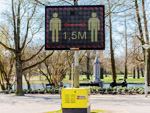On our way towards the 1.5-metre society

We are beginning to hear some good news in these challenging times. The physical distancing measures seem to be working in many countries, including the Netherlands. And the rate of infection is slowing somewhat, even in disease hotspots such as Italy and Spain. In many places, therefore, authorities are beginning to reflect on how they can ‘reopen’ society, realising that self-isolation and the closing of schools and businesses can only be sustained for so long without causing severe damage.
It is an illusion, though, to think that everything will go back to a situation that we consider normal. There is still no cure for COVID-19 and we still don’t know how the virus will develop, for example, with rising temperatures in the upcoming summer season. Furthermore, it is probably difficult to relieve us from all the measures overnight.
Reopening society can best be compared to an engine that has to be brought back to speed slowly and carefully. In Denmark, for example, schools are opening consecutively, starting with preschool, followed by primary and secondary schools. In Austria, only small shops are allowed to open; others will have to follow. Whatever these measures are, it is also to be expected that maintaing physical distance from others will remain part of the new open policy. Some people are calling it the ‘1.5-metre rule’, which refers to a presumably safe distance for people to keep between each other to prevent transmission of the new coronavirus.
Although it sounds like a simple measure, this rule alone will bring immense challenges with it. How can you implement this successfully in public transport, movie theatres, restaurants? It will not only be a logistical problem, but I’m even more concerned about how this distance will affect us as a society. You can’t function in the long run by staying away from each other and I’m concerned about the toll this may take on us personally. Some of these policies—although desirable from a public health perspective—could possibly have negative effects.
Some people are proposing, for instance, to test everyone and to allow those who have overcome the disease and are apparently immune from re-infection to be granted more rights and more access to public life. And at the same time, high-risk populations such as the elderly would have to remain more isolated. I’m not only concerned that such labelling would lead to the stigmatisation of certain groups but that it would also affect the basic equality of citizens in a democratic society.
When we implement such measures, we need to look at a much broader picture than just the infectious disease, since COVID-19 is not only a medical challenge but also increasingly a societal challenge. Looking at the problem from this perspective, scientists have postulated that we need to address the issue in at least four waves:
- Wave 1: the immediate impact of COVID-19 on morbidity and mortality
- Wave 2: the effects of restricted resources on unrelated medical conditions
- Wave 3: the effects on healthcare interruptions for the chronically ill
- Wave 4 (the most prominent one): the effects of stress, burnout, and economic and psychological problems
This means that even if we were to find a treatment for COVID-19 or if the virus were to simply disappear, the effects of this crisis will still be felt for a long time. So we must be realistic about it, even when we begin to ‘reopen’ society in the near future.
Some sectors, such as the airline industry, will be severely downsized and their very existence is likely to be threatened. However, the education sector, including higher education, will be needed more than ever. Because one thing is clear—to address these challenges at hand, we need scientific evidence (and not alternative facts). And we need educated experts, which means that we have to train doctors, psychologists, economists, engineers, lawyers, philosophers and social scientists, just to name a few, to deal with this multifactorial issue. Even if we have to organise ourselves differently in the ‘1.5-metre society’, which could very well become the ‘new normal’, we will be needed more than ever in the ‘post-COVID’ era. That is why we should already begin to reflect on how we can best address these issues in the long run. Let’s get ready for it.
Amidst this COVID-19 crisis we are all bombarded by the news channels – often also with information on medical issues. These news items include unfiltered and even dangerous information, for example on social media. In this context I will provide this medical blog where I share my thoughts, and aim to focus on evidence rather than on hype. These are personal opinions that should provide some food for thought for our academic community. They are not intended as formal statements by the executive board.
Other blogs:
Also read
-
After an exhausting few months in the ‘COVID-19 era’—as we can call it now—after months of hard work and the stress of dealing with a pandemic, everybody is looking to take a break during the summer. But unlike in recent years when we could plan our summer vacation months in advance, this year it...
-
It feels sometimes as if the whole world of science is working exclusively on finding a cure for COVID-19. If you are looking at the search for an effective vaccine, it was recently published in The New York Times that more than 130 vaccine candidates are currently in the pipeline, which is still...
-
In the current phase of the COVID-19 pandemic, countries across Europe are fortunately seeing a decrease in detected infections, hospital admissions and deaths. This is the effect of lockdown policies with different elements but with the common denominator of social distancing, travel restrictions...



